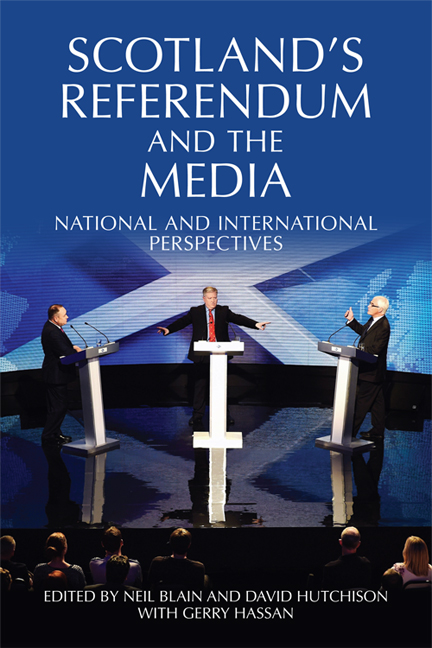Book contents
- Frontmatter
- Contents
- Preface
- Part One The Referendum in Scotland
- Part Two Views from the UK
- Part Three International Perspectives
- 13 ‘Knock-on Consequences’: Irish Media Coverage of the Scottish Referendum
- 14 Spain, Catalonia and the Scottish Referendum: A Study in Multiple Realities
- 15 The French View
- 16 The Scottish Referendum in Austrian, German and Swiss Media
- 17 The Scottish Referendum: The View from Quebec
- 18 The Scotland Referendum in the English-language Canadian Media
- 19 Australia and the Scottish Independence Referendum
- 20 Afterword: Reimagining Scotland in a New Political Landscape
- Notes on the Contributors
- Index
17 - The Scottish Referendum: The View from Quebec
from Part Three - International Perspectives
Published online by Cambridge University Press: 05 August 2016
- Frontmatter
- Contents
- Preface
- Part One The Referendum in Scotland
- Part Two Views from the UK
- Part Three International Perspectives
- 13 ‘Knock-on Consequences’: Irish Media Coverage of the Scottish Referendum
- 14 Spain, Catalonia and the Scottish Referendum: A Study in Multiple Realities
- 15 The French View
- 16 The Scottish Referendum in Austrian, German and Swiss Media
- 17 The Scottish Referendum: The View from Quebec
- 18 The Scotland Referendum in the English-language Canadian Media
- 19 Australia and the Scottish Independence Referendum
- 20 Afterword: Reimagining Scotland in a New Political Landscape
- Notes on the Contributors
- Index
Summary
For Quebecers, the holding of the Scottish referendum was of great significance. For various reasons, Quebec felt challenged by this referendum. First, it has in common with Scotland its past of being a nation which became part of the British Empire, in Quebec's case as a result of conquest, in Scotland's by agreement between the parliaments of the two countries. Second, Quebec also shares with Scotland a sense of national identity which distinguishes it from the state to which it belongs. Finally, like Scotland, it is a ‘small nation’ seeking to acquire more sovereignty in a very different global context from the one usually associated with independence of peoples, such as decolonisation, war, or the collapse of empire. In addition, for many Quebecers, a vote in favour of Scottish independence could revive the Quebec sovereignty movement which, even if it is still present in the Quebec political landscape, does not have the same vigour any more, especially after the defeat of the Parti Québécois in provincial elections in April 2014. Therefore, the past of Quebec, and its future, are associated with the Scottish referendum. As a result, the media coverage of this event could not be anything other than a distinctive one.
The Political Context in Quebec
‘Referendum’ is not a neutral word in Quebec. Associated with divisive issues in recent history, it was a device notably used by the federal government in 1898 to allow the prohibition of alcohol. The majority of provinces voted Yes, except Quebec which voted against at 81.5 per cent. However, since the overall majority in favour was not high (51.3 per cent), the federal government left to the provinces the decision to prohibit the sale of alcohol on their territory. The federal government also held a plebiscite in 1942 in order to be released from its promise of not imposing compulsory military conscription, as it had done in 1917. In fact, the country was deeply divided, since for French Canadians, who bitterly recalled their forced involvement in the Boer War and in the First World War, compulsory conscription for a war being held in Europe was a symbol of British domination.
- Type
- Chapter
- Information
- Scotland's Referendum and the MediaNational and International Perspectives, pp. 195 - 203Publisher: Edinburgh University PressPrint publication year: 2016



